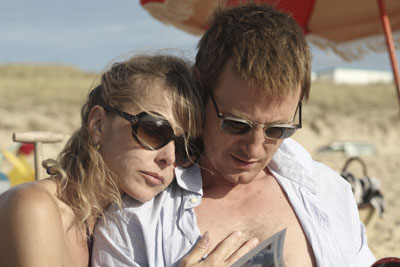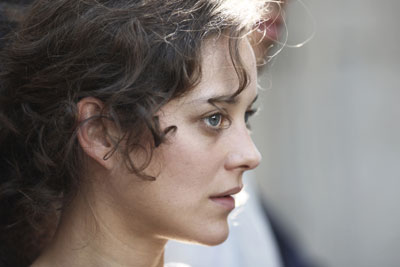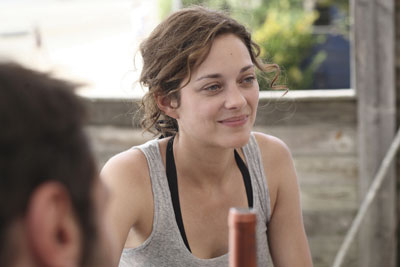Alain Attal, Hugo Sélignac and Gilles Lellouche Little White Lies Interview

Alain Attal, Hugo Sélignac and Gilles Lellouche Little White Lies Interview
Cast: Francois Cluzet, Marion Cotillard, Benoit Magimel, Gilles Lellouche, Jean Dujardin, Laurent Lafitte, Valerie Bonneton, Pascale Arbillot, Anne Marivin, Louise Monot, Joel Dupuch, Hocine MerabetDirector:Guillaume Canet
Genre: Comedy, Drama
Running Time: 154 minutes
Synopsis: Guillaume Canet has assembled an outstanding cast of some of France's finest actors - headed by Academy Award-winning Marion Cotillard - to make an entertaining and finely observed drama that brilliantly walks the line between laughter and tears.
A group gathering is hosted every year by a couple at their beautiful beach house where they kick-off their summer vacation by celebrating the birthday of one of the gang. Fun, fine wine and seafood mix with sun and sand as they all leave their city stresses and inhibitions behind. But this year is different. One of them is badly injured in a serious motorcycle accident just as they are about to leave Paris for their seaside reunion. His friends flock to his bedside, where their unconscious pal is still alive but in intensive care. What to do? Stay in Paris to be by his side, or leave for their vacation having been assured that there is nothing they can do? By the time they return he should be conscious and up for visitors.
After some intense discussion, they decide to head off for enjoyment and relaxation. Over the course of the next week, all the tensions within this group erupt into full daylight. Through a succession of incidents, the group is pulled apart and dragged together by their ties of loyalty and marriage. Their relationships, convictions, sense of guilt and friendship are sorely tested. They are finally forced to own up to the little white lies they have been telling each other.
Release Date: 16th June, 2011
An Interview with Alain Attal
Making a movie with Guillaume is a pleasure every time. He's a very loyal man, for whom a working environment based on trust is particularly important. Little White Lies is his take on his generation and, more widely, on contemporary society. It's a movie about the damage you cause (or suffer) by constantly putting off until later the really important issues.
The artistic and commercial success of Tell No One gave Guillaume the time to write the screenplay he dreamed of. And I made sure I could give him the time he needed on set and in the editing suite. The rough cut was four hours long! He insisted on putting everything he'd shot into it. I wasn't allowed to see it because he preferred to bring it down to a more customary length on his own. It's the first time since we started working together that Guillaume has attained such a level of expertise and authority. He was the captain of the ship, driven by tremendous energy. During the shoot, I noticed how astonishingly determined he was. Guillaume had never been so in control of his previous movies, in every sense-from the script (the first one he wrote alone, without Philippe Lefebvre) to the locations that he chose personally, like every single song on the soundtrack.
A subtle blend of genres
I decide to ask Hugo (Sélignac) to line produce. After years working together, he's got where he deserves to be. I met him when he was an intern on Selon Charlie by Nicole Garcia. He's come a long way. He learns fast and manages budgets with an innate talent. As a result, I didn't have to be on set in Cap Ferret every day. One return trip per week was enough. I received the dailies and discussed them on the phone with Guillaume.
The lessons learned on Tell No One allowed him to aim once more for a subtle blend of genres. Whether he's making a thriller or a comedy, like this movie, nothing discourages him from infusing the story with emotion. He has a unique intuition, a sixth sense for what will work best in a movie. Little White Lies is the finest example of that.
 An Interview with Hugo Sélignac
An Interview with Hugo SélignacGuillaume had such a specific vision of what he wanted that the read-throughs of the script with the cast probably took most of these well-established stars back to the days when they were starting out. Guillaume wanted the tone to be precisely as he described it, or it changed the meaning of the lines.And sometimes, when Guillaume asked them to appear in the background of certain shots, they may have felt like they'd been hired as extras. Obviously, that wasn't so and, on screen, the result speaks for itself. There is so much emotion in the scenes where the friends' interactions emerge over several shots, in the glances and expressions that Guillaume captures magnificently, not just in the dialogue. In the end, everybody agreed on this-we haven't made a film, but the film. Guillaume gets the very best out of people on set. I realised that I went into this business to work with artists like him. Unlike some directors, he applies the concept that everybody is important on a shoot. In Guillaume's eyes, every single person working alongside him has a specific role to play, from the intern to François Cluzet. The remarkable thing about Little White Lies is the universal nature of the issues the characters are wrestling with. They are valid at age 15, 35 or 65 across all of society. The sexual frustration of Pascale Arbillot's character, for example; or Benoît Magimel's character's epiphany about his true nature; Gilles Lellouche's character's chronic inability to commit; or wondering if somebody is really "the one", or if you're doing the right job, or if you can truly count on your friends, etc.
People say that Little White Lies is an ensemble movie, but I prefer to describe it as the story of a group of 8 friends, each of whom is the hero of his or her own story.
On the shoot, my job consisted of taking the weight off Guillaume's shoulders, encouraging him to delegate as much as possible so that he could focus on the job at hand, and taking charge of fundamental logistical and technical issues, and subsidiary matters to which he would devote a halfhour of his time, like what cheese the canteen should serve for lunch, because he was genuinely concerned about the whole crew's welfare.
It was very wise of Guillaume to dismiss, early on, the idea of acting in the movie as well as directing. It would have been very tricky to do both and almost impossible to offer such precise direction to the rest of the cast.
It was a delight working on Little White Lies. It's a movie with heart. You come out wanting to tell people you love them.
 An Interview with Gilles Lellouche
An Interview with Gilles LelloucheLittle White Lies is my fifth movie with Guillaume. We met at Alain Attal's company Les Productions du Trésor. It was late at night. I was writing Narco and he was working on the script of Mon Idole. It was just after Vidocq was released and he was pretty down. It was soon after The Beach with Leo DiCaprio, too, so there was always a horde of people hovering around him. We talked most of the evening, openly and honestly, and I was struck by how insightful he was.
His development as a director has been spectacular. In Mon idole, you can pick out his influences (Paul Thomas Anderson, Martin Scorsese...). In Tell No One, it's already much less obvious. Formal issues are less important to him than the story. Directing isn't Guillaume being a pretentious actor, it's a real necessity for him. He injects life into his art. When I met him, he carried around a notebook and jotted down anything that could be a good idea for a movie or a scene even, that he had yet to write, of course.
A timeless, universal tale
Cap Ferret has been our base camp for the last ten years. All the characters draw to a greater or lesser extent on episodes that happened there or people we met there. But the strength of Guillaume's movie is that he has transcended the raw material. Nothing is anecdotal. It's not a movie about our vacation with comic book plotting. It's a timeless, universal tale.
I play a second-rate actor, a superficial poser and womaniser. He's a good friend, with the good grace not to burden the others with his problems. Eric is the dynamo of the group.
In Little White Lies, Guillaume isn't far from what Claude Sautet used to do. He's always liked movies with groups of friends. He asked us all to watch The Big Chill again, and John Cassavetes' Husbands. Making a movie with eight characters, of roughly equal importance, is a real challenge and, when you see the result, he has succeeded brilliantly.
MORE
- Mission: Impossible Fallout
- Glenn Close The Wife
- Allison Chhorn Stanley's Mouth Interview
- Benicio Del Toro Sicario: Day of the Soldado
- Dame Judi Dench Tea With The Dames
- Sandra Bullock Ocean's 8
- Chris Pratt Jurassic World: Fallen Kingdom
- Claudia Sangiorgi Dalimore and Michelle Grace...
- Rachel McAdams Disobedience Interview
- Sebastián Lelio and Alessandro Nivola...
- Perri Cummings Trench Interview



